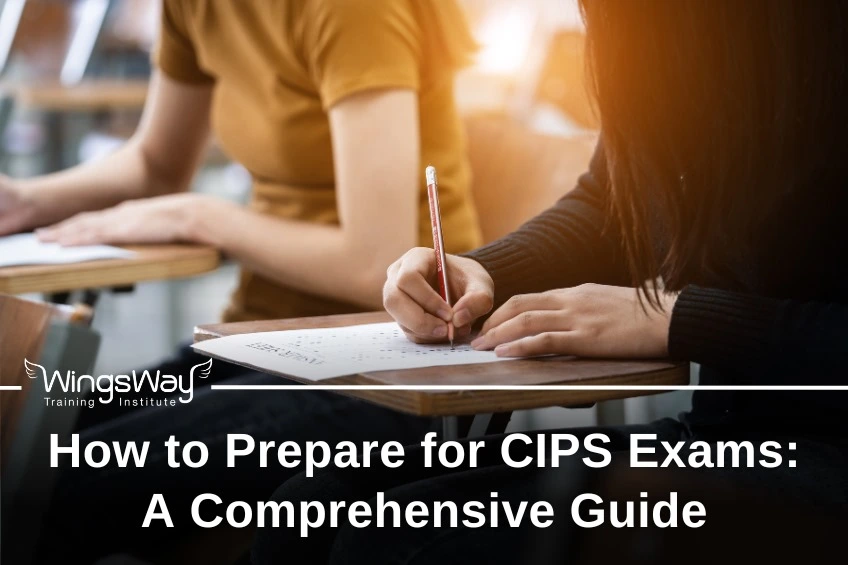
How to Prepare for CIPS Exam: A Comprehensive Guide
- Posted by WingsWay Training Institute
- Categories Procurement, Supply Chain
- Date 02/05/2025
Are you preparing to take the CIPS exam this year? Are you looking for tips to help you prepare for your exam, or are you just browsing through the internet to see how the CIPS exams go?
This guide is a comprehensive resource for CIPS Diploma and Advanced Diploma aspirants, blending structured study plans, exam strategies, and practical tips to excel in Constructed Response (CR) and Objective Response (OR) exams.
Drawing from CIPS guidelines, study centre practices, and your UAE-based WingsWay CIPS Study Centre’s expertise, this guide emphasises on applying procurement knowledge at work to become a procurement champion. It also covers the unique selling propositions of WingsWay for CIPS exams, highlighting why it’s the ideal partner for your CIPS journey.
Table of Contents
ToggleCIPS Diploma Overview & Study Plan:
CIPS Levels 4 (Diploma) and 5 (Advanced Diploma) build foundational and advanced procurement skills, paving the way for MCIPS status (via Level 6). Its various modules are assessed through:- Objective Response (OR) Exams: Multiple-choice questions (MCQs) testing knowledge and application
- Constructed Response (CR) Exams: Written answers requiring in-depth analysis.
Why Study CIPS?
- CIPS qualifications are globally recognised, equipping you with practical skills for strategic procurement roles.
- Unlike academic programs, CIPS is a “handbook” for workplace success, enhancing your decision-making in sourcing, contracts, and supplier management and mastering procurement strategies.
Integrated Study Plan for Subject Matter Expertise
-
Long-Term Preparation (3-6 Months Before the Exam)
- A structured study plan 3-6 months prior to the exam builds a solid knowledge base, prevents last-minute cramming, and allows ample time to apply the concepts you learn at work.
It also helps boost your confidence about the subject and improves its retention.
Pro Tips:
-
- Dedicate 150-200 hours per module (8-10 hours/week). Study 2-3 hours, 3-4 times weekly, with specific goals.
-
- Download the CIPS syllabus; prioritise high-weightage topics.
-
- Go through CIPS Study Guides, use WingsWay’s LMS for case studies/QA sets.
-
- Example: Apply supplier evaluation (L4M4) or contract management (L4M3) at work to build practical skills.
-
Medium-Term Preparation (1-3 Months Before the Exam)
- Active learning and doing practice exams deepens subject comprehension, bridges the gap between theory and practice, and helps identify knowledge gaps, ensuring you’re ready for scenario-based questions.
Pro Tips:
-
- Post-Class Reading: Review chapters in detail, make concise notes, and create mind maps linking concepts (e.g., procurement cycle → supplier relationships).
-
- Practice Exams: Complete mock exams per module via WingsWay’s LMS. Time yourself (60 MCQs in 90 minutes for OR 45 minutes per CR question). Analyse errors to identify and target weaknesses.
-
- Real-World Scenarios: Solve WingsWay case studies (e.g., contract types in L4M3) and relate theories to your workplace (e.g., PESTLE for supplier risks).
-
- Class Engagement: Contribute actively in WingsWay classes as per mentor instructions to clarify concepts.
-
Short-Term Preparation (2-4 Weeks Before the Exam)
- Consolidating your knowledge and simulating exam conditions before you take the exam sharpens your exam techniques and reduces exam-related anxiety. This can be critical for both CR and OR formats.
Pro Tips:
-
- Create 1–2-page revision notes per module, focusing on your weak areas (e.g., negotiation in L4M5). Review CIPS glossaries for precise terms and their definition (e.g., “tendering” vs. “negotiation”).
-
- Practice OR (60 MCQs in 60 minutes) and CR (45 minutes per question) in a quiet setting. Attend WingsWay’s mock exam sessions.
-
- Learn command words (e.g., “analyse,” “evaluate”). Use CR templates (introduction, analysis, conclusion). Eliminate MCQ distractors by focusing on “most appropriate.”
-
- Attend WingsWay’s pre-exam reviews for targeted guidance.
-
- Follow a timetable, starting with easier topics to build confidence.
-
Day Before Exam
- A calm and prepared mindset a day before the exam ensures peak cognitive performance on the exam day. It helps you train your mind and avoid last-minute stress or confusion.
Pro Tips:
-
- Do a light review. Skim through your revision notes; avoid studying any new material.
-
- Prepare ID, admission card, and stationery; confirm the venue of the exam and travel.
-
- Use deep breathing to relax. Get ample sleep.
-
- Visualise success as a procurement champion and stay positive.
-
Exam Day
- Strategic time management through the exam paper and composed behaviour can maximise your ability to showcase knowledge well under pressure.
Pro Tips:
-
- Eat a protein-rich breakfast; arrive 30-45 minutes early to the exam centre.
-
- Read instructions; allocate time by marks (1.5 minutes per MCQ, 45 minutes per CR question). Answer confident questions first; review if time allows.
-
- Use deep breathing to stay focused and manage stress.
-
Workplace Integration
- Applying theoretical CIPS knowledge at work reinforces learning and builds practical skills, making you a confident professional.
Pro Tips:
-
- Apply negotiation (L4M5) or supplier relationships (L4M6) in your role.
-
- Test models like the Kraljic Matrix in real scenarios.
-
- Document impacts (e.g., cost savings) to showcase value, aligning with WingsWay’s focus on practical application.
-
Motivation and Mindset
- Along with training on the subject matter, training your mind to stay positive and motivated sustains long-term effort and improves exam performance.
Pro Tips:
-
- Celebrate milestones, as emphasised by WingsWay’s motivational approach. Prioritise progress over perfection.
-
- Visualise success. Aim to be a procurement champion.
-
- Take breaks. Rest 5-10 minutes hourly to avoid burnout.
-
- Seek support. Engage with WingsWay mentors and peers, leveraging their community-driven support.
CIPS Exam-Specific Strategies
Below are some examination tips for both Constructed Response (CR) and Objective Response (OR) exams:Constructed Response (CR) Exams
- Carefully read and analyse the question and identify the command words (e.g., “discuss,” “explain,” “analyse”). These dictate how you should structure your answer.
- Allocate your time wisely. With 180 minutes for four questions, aim to spend about 45 minutes per question.
- Support your answers with relevant examples and theories. This demonstrates your understanding of the topic and can earn you additional marks.
- Write the names of theories or methods correctly, as accurately as you can.
- Practice answering questions from the study guide to familiarise yourself with the format and reduce exam anxiety.
Guidelines:
- Understanding the Exam Paper Structure and Instructions:
-
- This is a 100-mark exam with four questions, each worth 25 marks. This dictates the relative depth and time allocation for each question.
-
- The instruction to “Answer all four questions” is straightforward. “Each question carries 25 marks” reinforces the equal weighting.
-
- Question 4 is a case study, which means the answers should be grounded in the provided context of the case study.
- Analysing Each Question:
For each question, consider these aspects:
-
- The paper states the Learning Outcome for each question. This is a crucial guide. For instance, Question 1 relates to “Demonstrate the application of the procurement cycle.” This means the answer must go beyond simply describing the cycle; it needs to show how it’s applied.
-
- The command words (e.g., Describe, Discuss, Explain, Analyse, Evaluate, Compare, Contrast, Identify) are critical for understanding the type of answer expected.
-
- Describe: Provide a detailed account.
-
- Explain: Make something clear by describing it in more detail or revealing relevant facts. Detail why something happens.
-
- Discuss: Offer a considered and balanced review that includes a range of arguments, factors, or hypotheses. Opinions or conclusions should be presented clearly and supported by appropriate evidence.
-
- Analyse: Break something down into its component parts, examine them in detail, and explain how they relate to each other.
-
- Evaluate: Make a judgment based on criteria; determine the value of something.
-
- Compare: Identify similarities.
-
- Contrast: Identify differences.
-
- Identify: Select and name.
-
- Marks Allocation: The number of marks allocated to each sub-question dictates the length and depth of the answer.
-
- 5 Marks: Typically requires a concise and focused answer with a few key points.
-
- 6-8 Marks: Requires more elaboration and potentially some examples.
-
- 10 Marks: Requires a more comprehensive and detailed response, potentially with multiple perspectives or arguments.
-
- Keywords/Focus Areas: Identifying the core topics within the question. For example, in Question 2a, the keywords are “supplier selection criteria,” “cost,” “quality,” and “ethical considerations.” The answer must address all of these.
- Examples: The paper often prompts for examples (e.g., “Unilever or Toyota,” “Amazon,” “Shell or BP,” “Nike” or Tesla). These are essential for demonstrating practical understanding and application of concepts.
- Structuring Your Answers:
-
- Introduction (Implicit): While not explicitly written as an “Introduction” heading for each sub-question, the first sentence or two of each response serves as a brief introduction, setting the context and outlining the scope of the answer.
-
- Main Body: The main body of the answer addresses the specific requirements of the question, using clear and concise language. Aim for a logical flow of ideas, supported by relevant examples and evidence.
-
- Conclusion (Implicit): Similar to the introduction, the final sentence or two often provide a brief summary or concluding thought, reinforcing the key points of the answer.
-
- Use of Headings/Subheadings: Headings and subheadings are used to break up the text and improve readability.
-
- Bullet Points: Bullet points are used to present lists of information in a clear and organised manner.
- Determining the Number of Points/Level of Detail:
This is where judgment and experience come in.
-
- Marks per Point: A general guideline is to aim for approximately 1-2 well-explained points per mark. So, a 5-mark question might require 3-5 solid points. A 10-mark question would need 6-10 points.
-
- Depth of Explanation: Each point should be explained clearly and concisely, with enough detail to demonstrate understanding. Avoid vague or superficial statements.
-
- Relevance: Focus on the most relevant points that directly address the question. Avoid including extraneous information.
-
- Examples: Use relevant examples to illustrate your points and demonstrate practical application.
-
- Balance: Ensure that the answer is balanced and covers all aspects of the question.
-
- Word Count (Indirect): While there’s no specific word count, the marks allocation and the need to be concise naturally limit the length of the answer.
- General Guidelines and Considerations:
-
- Accuracy: Ensure that all information presented is accurate and up to date.
-
- Clarity: Write in a clear and concise style, using language that is easy to understand.
-
- Relevance: Focus on the specific requirements of the question and avoid going off on tangents.
-
- Critical Thinking: Demonstrate critical thinking by analysing and evaluating different perspectives.
-
- Application: Apply theoretical concepts to practical situations and provide relevant examples.
-
- Ethical Considerations: Always consider ethical implications and responsible sourcing principles.
Objective Response (OR) Exams
- Read questions carefully to avoid misinterpreting tricky wording.
- Select the exact number of answers requested in multiple-choice questions.
- Don’t panic if you don’t understand a question. Use common sense and think of the answer from a procurement professional’s perspective.
- Different skills are required towards solving MCQs.
- Questions will test recall of facts, terms, or basic concepts.
- Understand: MCQs that assess comprehension and interpretation of information.
- Apply: Questions requiring the use of learned information in new situations.
- Analyse: MCQs that involve breaking down information and identifying relationships.
- Evaluate: Questions asking students to make judgments based on criteria.
- Memorise key organisations (e.g., ILO, WTO) and ISO standards relevant to procurement, as these often appear in exams.
General Tips for Both Exam Types
- Study the syllabus thoroughly, as all content can potentially appear in exam questions.
- Practice with trial questions, but be aware that actual exams may be more challenging than example quizzes.
- Consider your exam strategy, such as the order in which you take modules (alternating easy and hard) and how many exams to attempt at once.
- By following these tips and dedicating sufficient time to preparation, you can improve your performance in CIPS examinations and increase your chances of success.
Why People Fail in CIPS Exams?
There are several common causes of failure in Constructed Response (CR) and Objective Response (OR) exams. Understanding these reasons can help students improve their performance and increase their chances of success.Causes of Failure in CR Exams
- Lack of understanding: Students often fail due to insufficient knowledge of the subject matter.
- Insufficient detail: Responses that lack depth and fail to provide enough information are common reasons for failure.
- Failure to provide examples: Not supporting answers with relevant examples can lead to lower scores.
- Poor question analysis: Misinterpreting questions or not following instructions can result in off-topic answers.
- Time management issues: Failing to allocate time properly for each question can lead to incomplete answers.
- Lack of practice: Insufficient preparation and not practising past papers can leave students unprepared for exam formats.
Causes of Failure in OR Exams
- Misreading questions: Failing to carefully read and understand the question can lead to incorrect answers.
- Overconfidence: Assuming knowledge without proper preparation can result in poor performance.
- Insufficient preparation: Not covering the entire syllabus or lacking practice can lead to gaps in knowledge.
- Poor time management: Spending too much time on difficult questions can result in unanswered questions.
- Exam anxiety: Stress and nervousness can negatively impact performance and lead to mistakes.
General Causes Applicable to Both CR and OR Exams
- Procrastination: Delaying study and preparation until the last minute can result in inadequate knowledge.
- Lack of exam strategy: Not having a clear approach to answering questions can lead to inefficient use of time.
- Poor study habits: Inconsistent or ineffective study methods can result in gaps in understanding.
- Underestimating the challenge: Failing to recognise the difficulty of the exam can lead to insufficient preparation.
Post-Exam Strategy
Reflecting and adjusting your approach to studying for and tackling the exam ensures continuous improvement for future CIPS modules. Tips:- Take a 1–2-day break before resuming study.
- Reflect on what worked (e.g., WingsWay case studies) and refine strategies.
- Use exam feedback (if available) to improve.
Why Choose WingsWay as Your CIPS Training Centre?
WingsWay is a supportive, expert-led study centre that ensures you stay motivated, master the curriculum, and apply knowledge effectively in your workplace. USPs of WingsWay Training Institute for CIPS training:- Authorised CIPS Partner in UAE: WingsWay’s accreditation ensures alignment with CIPS standards, delivering high-quality training tailored to regional procurement contexts.
- Interactive Learning Platform: The WingsWay LMS offers exclusive QA sets, mock exams, and case studies, enabling scenario-based practice for both CR and OR exams.
- Expert Mentors: Experienced MCIPS trainers with extensive CIPS and industry expertise who provide personalised guidance, fostering deep understanding and workplace application.
- Interactive Learning in Collaborative Environment: Live discussions, Q&A segments, peer collaboration, and motivation.
- Flexible Study Options: Blended learning (online and in-person) options accommodate working professionals and ensures consistent progress suited to your schedule.



